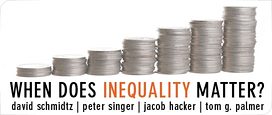Lead Essay
“Everyone cares about inequality. Caring about inequality, though, is not enough to make inequality matter,” writes political philosopher David Schmidtz. “Unless we have the right sorts of reasons to care, equality does not matter, at least not in the way justice matters. So, why care about inequality?” Drawing on his illuminating new book, Elements of Justice, Schmidtz lucidly clarifies which inequalities matter, and why, in a world where our fellow citizens are partners in a cooperative system of joint production, not competitors in a race.
Response Essays
“When Jeremy Bentham first suggested that the pains and pleasures of an African should count as much as the happiness of an English person,” philosopher Peter Singer writes, “this view had radical implications, for slavery was still legal in the British colonies. Today, the suggestion that the pain of a nonhuman animal might count as much as the pain of a member of our own species is still radical. That is why this sense of equality remains important.”
Picking up where David Schmidtz’s lead essay ends, Cato Institute Senior Fellow Tom G. Palmer argues that a common line of reasoning used to justify the authority of the state to rearrange the unequal distribution of wealth is based on a mistake. The kind of equality that matters, Palmer argues, is the “equal right of every person to exercise choice over his or her own person.” The inequalities that emerge from the voluntary interaction of persons exercising that right are not “ours” to reconfigure.
In his reply to David Schmidtz’s lead essay, Yale political scientist Jacob Hacker agrees that material inequality as such is not our greatest concern. “The problems arise,” Hacker argues, “when resource inequalities translate into substantial, cumulative, and self-reinforcing inequalities of political power.”
The Conversation
Related at Cato
» Justice as Something Else by Anthony de Jasay
» A Message to Redistributionists by P.J. O’Rourke
» Class Struggle? by Alan Reynolds

